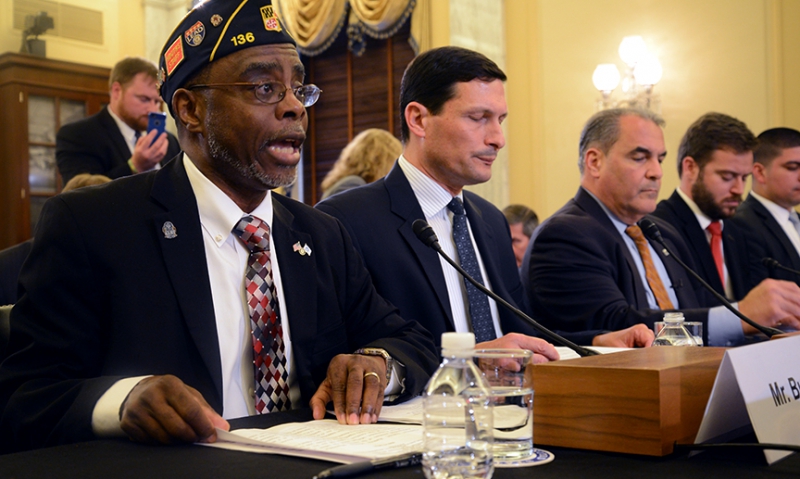
Legion urged House members to pass The Veterans Access to Community Care Act at recent hearing.
The American Legion testified before Congress at a May 12 hearing exploring the implementation and future of the Department of Veterans Affairs' Veterans Choice Program. The Legion’s stance was guided by feedback gathered during its Veterans Benefits Center (VBCs) at different VA facilities across the country.
Roscoe Butler, deputy director of The American Legion's Veteran Affairs & Rehabilitation Division, presented the Legion’s testimony before the House Committee on Veterans’ Affairs Subcommittee on Health. He noted that, during a recent VBC visit to Puerto Rico to assess the healthcare system there, local veterans expressed the frustration they encountered when Veterans Health Administration staff insisted that no one on the island is eligible for health care under the Choice Card program because there is no medical facility that is further than 40 miles from any geographic location on the island.
Signed into law on Aug. 7, 2014, as Public Law (PL) 113-146, The American Legion supported the passage of H.R. 3320 - the Veterans Access, Choice, and Accountability Act (VACAA) of 2014 - as a means of addressing emerging problems with VA. With VA appointment wait times reaching unprecedented levels, Congress implemented the law to ensure that, when VA could not provide access to timely, high-quality health care inside the VA health care system, eligible veterans could elect to receive needed health care outside the system through use of the Choice Card. The law was intended to be a temporary measure until VA corrects its wait-time problem.
Further, the law authorizes veterans who were enrolled in VA health care as of Aug. 1, 2014, current eligible veterans or recently discharged combat veterans to be seen outside the VA through the Choice Card program by an approved non-VA health care provider. To use the Choice Card, veterans must have been unable to schedule an appointment within 30 days of their preferred date, clinically appropriate date or live more than 40 miles from a VA medical facility.
The American Legion is concerned that staff at many VA health-care facilities have failed to receive proper training on the Choice Card program, and as a result are communicating incorrect information to veterans.
Upon implementation of the program, nearly 8,000,000 Choice Cards were issued to veterans who reside more than 40 miles from a VA medical facility, and veterans whose appointments were delayed longer than 30 days from their preferred date or the date determined to be medically necessary by their physicians.
“The American Legion is optimistic that the recent changes used to calculate the distance between a veteran’s residence and the nearest VA medical facility, moving from a straight-line distance to actual driving distance, will allow more veterans access to care under the Veterans Choice program,” Butler said. “The American Legion also believes if VA were to move forward with the 40-mile rule change to only include a VA medical facility that can provide the needed medical care or services; everyone will see increases in utilization and access to non-VA health care.”
Recently, The American Legion learned that the VHA contract with Health Net and TriWest required these Third Party Administrators (TPAs) to report Daily Choice metrics to the VA, which were then posted on VA’s website. This contractual requirement expired shortly after the implementation of the contract, and the TPAs are no longer required to report these daily metrics. The last report VA provided to VSOs was dated March 31, 2015. The American Legion is concerned that since the TPAs are no longer required to provide these daily metrics, VA can easily lose track of the numbers or the data can be easily manipulated.
During his testimony, Butler called upon Congress to require VHA to continue reporting these daily metrics throughout the duration of the contract, or explain how they will continue to track this information.
Butler also called attention to the $5.5 billion the VA spent during fiscal year 2014 on non-VA health care. Many of VA’s non-VA purchase care programs are managed by different program offices in VA Central Office and some of the services are handled outside of VA’s Fee-Basis Claims Processing System, Butler said.
“Congress should also look into streamlining VA’s non-VA care statutory authorities," Butler said. "Once Congress gets a better sense of how the Choice Program will play out over the next couple of years, VA’s non-VA care statutory authorities should be consolidated and rationalized, incorporating lessons learned from the Choice Program.”
Like any new program implemented, there are kinks that need to be worked out and room for improvement. The American Legion applauds the Senate for unanimously passing an amendment reminding VA of its obligation to provide non-VA care when it cannot offer that same treatment at one of its own facilities that is within the 40 miles driving distance from the veteran’s home.
“We now call upon the House to take up H.R. 572: The Veterans Access to Community Care Act, and ensure its swift passage. Let’s get this bill to the president’s desk and make sure we’re taking care of our rural veterans,” Butler said.
Butler is set to testify again today on the Choice Card program in front of the House Committee on Veterans' Affairs.
- Legislative

